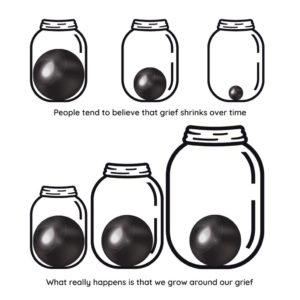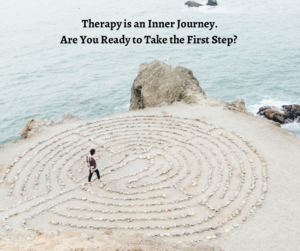
Dream your dreams. And notice. What are the internal barriers that stand in your way? What beliefs do you hold about yourself or your life which limit your potential? If you were to transform these obstacles, what might happen? Counseling and coaching offer a path to identifying and overcoming those limits which have taken hold within you. It takes courage, attention, and a willingness to go within and approach yourself with curiosity and compassion. At times it will be intense, but your development and well-being are worth it.

Grief comes in many forms and can result from any number of events. The passing of a loved one, the loss of a relationship or a job, moving to a new location, or even the letting go of a dream that no longer seems possible or appropriate. Any type of transition or change in life can involve significant loss and therefore, grief. If you’re struggling to make sense of your life as the result of a loss or major change, you’re not alone. Finding joy and meaning in life, as you continue the grieving process, is possible. The pain won’t necessarily be taken away, you will simply grow and expand to allow room for things like laughter, enjoyment, passion, and love. These things will exist alongside your grief because you will learn to create space within you for all of it. Your grief will no longer consume and dominate you, it will simply remain part of the rich tapestry that IS you.

The Stigma of Therapy
Posted on May 20, 2021
Does going to therapy mean you’re weak or flawed?
There is an unfortunate and inaccurate belief that has existed in our culture which is, thankfully, beginning to crumble: seeking psychotherapy, counseling or any form of mental health service is an indication of a personal flaw, shortcoming, or weakness. This damaging belief has led many who recognize the need or benefit of these services to either avoid them altogether or to accept them but with the added price of a devalued view of self. This outdated belief seems to arise from the notion that any form of mental health service is reserved for people with severe mental health disorders, such as those who experience psychosis, severe depression, or who struggle to function at a minimal level. And far too often, such individuals have been viewed as not having the proper constitution or fortitude to “pull themselves up by the bootstraps.” Holding such a belief requires ignoring the complexities of life and human behavior, including how past events and current biology and neurochemistry affect a person’s thoughts, feelings, and behaviors.
As the public view of mental health continues to evolve and become more informed, we are seeing a less stigmatized view of common disorders such as anxiety and depression. Before the COVID-19 pandemic, 15% of U.S. adults reported anxiety symptoms and 18.5% had depressive symptoms, according to data from the 2019 National Health Interview Survey. More recent evidence suggests the prevalence of mental health conditions is even higher today. In a CDC survey conducted in June 2020, 30.9% of adults reported anxiety or depression.* With the life-altering effects of the pandemic as well as political and cultural unrest, it’s no wonder these rates continue to rise. The bottom line is, if you’re feeling anxious or depressed, you’re not alone.
It’s not me. It’s her/him/them. Right?
Our need to connect and be close to others is built into our biology and thus when we experience conflict or distance in our most important relationships, it can feel like a threat to our survival. Or, at the very least, a serious annoyance and distraction. Seeking help from a therapist, either in the context of couples or family counseling or through individual psychotherapy, is a proactive means to resolve these issues and improve what is arguably the most important aspect of our lives: our relationships with others.
Is a person ever done growing?
Even those who seem to do well in the important areas of their lives are known to struggle with things like self-doubt, uncertainty, low self-worth, stress, and inner conflict. Personal development and self-actualization are unending processes and include things like your evolving view of self, clarifying your life purpose, making meaning, goal setting and attainment, and living in a way that best uses your gifts and passions to not only benefit yourself but to serve the world.
So, seeking help is NOT a sign of weakness?
Anyone who wants to get good at something or master a skill, say, for example, playing tennis, or the violin, recognizes the importance of a good coach, teacher, or mentor. It would be unreasonable to expect yourself to become an expert at something without getting proper training, coaching, or instruction. And we would never consider someone weak for seeking out such guidance. Not at all. This demonstrates that the person is serious and committed to improving and mastering their desired pursuit. Along this path, there will be things the individual naturally does more easily and those things with which the person struggles and needs more attention, time and guidance. Similarly, if we want to master life, or simply improve our ability to function and thrive in an increasingly unpredictable and ever-changing world, we would be wise to seek assistance. The first step in true self-mastery is self-knowledge and understanding. I know of no better way to increase self-knowledge than through the process of therapy.
It takes courage and strength to seek therapy.
It can be difficult to acknowledge the areas of our lives in which we fall short, struggle, or need help. And while it’s important to celebrate our strengths, gifts, and those things at which we excel, it takes great courage to face our wounds and perceived shortcomings. But, these aspects of ourselves are often the most profound opportunities for growth. Embracing these parts of ourselves, as they are right now, is not always easy but with the guidance and support of a good therapist, this process can lead to transformation and the acquisition of new knowledge, wisdom, and strength.
So, take courage, be strong, and go talk to a therapist!
*Source: Medpage Today. Hlavinka, Elizabeth “NHIS Data Set Pre-Pandemic Anxiety, Depression Benchmarks – Disparities identified by age, sex, race, and geography.” https://www.medpagetoday.com/psychiatry/generalpsychiatry/88758

Taking the First Step
Posted on May 10, 2021
The first step of your therapy journey begins with finding a therapist who is right for you. Great therapy is built upon a great therapeutic relationship. In fact, studies have shown that the effectiveness of therapy depends more on the quality of the relationship between the client and the therapist than on the type of therapy provided, such as cognitive behavioral therapy, psychodynamic therapy, or any other number of effective approaches. As human beings, we just naturally connect with some people more easily than others. No matter how skilled a counselor may be, if you, as the client, don’t feel you can easily connect with them, the effectiveness of the therapy is going to be diminished. Think about it. Therapy usually involves talking about some uncomfortable topics, such as certain things about yourself that you may not like, or difficult things you’ve experienced. Are you going to be willing to share those things with a person to whom you don’t feel all that connected?
So, how can you determine if a particular therapist is a good fit for you before actually having some sessions with them? It isn’t always easy and sometimes you DO have to have a couple of sessions with a therapist before knowing for certain that it’s a good fit. If this happens and you see a counselor for a few sessions, only to decide it’s not a good fit or that it just doesn’t feel helpful, it may be discouraging or feel like you’ve wasted your time and money. But if you really believe there are changes you want to make in how you think, feel, or behave, changes in your relationships, or in how you view yourself, then it’s worth your time to try again with a different therapist. Just as everyone you meet doesn’t become your best friend, not every therapist you talk to is going to be a good fit for you.
So, here are a few things you CAN do to help you find the right therapist:
First, find out whatever you can about them. If they have a website, read over what they’ve written in regards to their approach to therapy, who they are, and any other information they share. If they have a profile listed on a site like Psychology Today or Good Therapy, read what they’ve written and see if it resonates with you. What are the issues you want to address in therapy? Does the therapist mention these issues? Does he or she treat these issues or concerns? How much experience do they have? Does the therapist’s age or gender matter to you? If the cost of therapy is a concern, find out what they charge or if they accept your health insurance. If they don’t accept your insurance, will you be able to afford to pay for their services out of pocket? What about availability? Is the counselor accepting new clients and, if so, do the hours they offer counseling fit with the times you’re available to attend?
Many counselors offer a free consultation prior to scheduling an appointment. This consultation generally lasts between 15-20 minutes and is your chance to ask any questions you may have about therapy or the therapist, and to get a little bit of a feel for who this person is and if you’re going to feel comfortable talking with them about your life. So, don’t be afraid to take advantage of this option, if available.
Finally, make sure you’re as clear as possible with the therapist about what you’d like to get out of the process. Some people come to therapy not knowing exactly what they want, they just know they need help. And if this is you, that’s OK. A good therapist will help you gain greater clarity regarding appropriate goals for therapy. It’s just important that you share as much as you can about your expectations and needs so that the therapist better understands how to help.
So that’s it! A few tips on how to find the right therapist. Although the process of starting therapy can be a little intimidating, if you forge ahead bravely, while taking the time to do a little investigating, you may just find yourself in one of the most helpful relationships of your adult life.